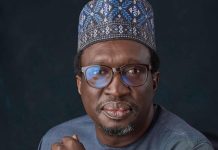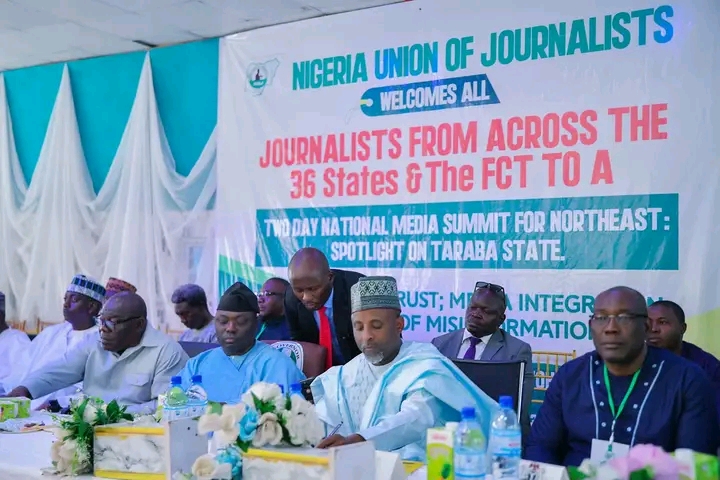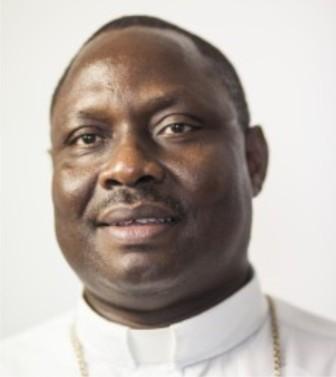Bishop Charles Michael Hammawa is a Catholic Bishop of Jalingo. In this interview with Christiana Babayo and Jethro Yerga, he laments on the damage that the church has incurred and other issues of security concern.
In recent times, there have been several cases of kidnapping and assassination of priests in the country. Why are these calamities befalling the Catholic Church?
It is really a sad reality that we are living with. All crimes in the country emanate as a result of dissatisfaction of the state of the nation, bad governance and bad economic situation. When people are dissatisfied, most of them who do not have the character to resist the temptation to do evil to make ends meet or even to bare their cry and opposition will come out of their shell. Again some people just make up their minds weather things are good or not, so far as they can make money easily or quickly, they are okay with it. But one may ask, is it quickly and easily? Because most of them who indulge in such act do pay the cost. So it is not quick or easy in a way. It may give that implication if they succeed in getting millions on a particular person but at the end of the day, they are also pay for it. So, what is the joy about it? So to me, I will classify it under a primal reason, ‘dissatisfaction with governance’ with lack of justice, and fair play in the society.
As to Why befalling the Catholic and religious leaders in general, it is left for any body’s imagination but if recent survey in the past has shown that Nigerians are very religious people, why should we attack religious leaders? It is a contradiction in terms. Just as it is also contradictory to say we are religious people and yet our leaders are corrupt and so bad that they are not interested in good governance. Our Security agencies are compromised, our judges are the highest bidders and we are still religious people. So it is something that no one can point a finger on. But at the end of the day, it is a bad phenomenon and a bad omen. It is not good for anybody. We just have to keep appealing to people’s good heart to stop this and pursue legitimate ways of living their lives.
Taraba State has experienced a lot of communal and religious crisis, to what extent is the Catholic Church in general and the Jalingo Dioceses affected?
It has affected the entire society and Catholic Church is part of the same society. It has actually affected everything, everybody, every aspect of life. Politics, economics, agricultural activities and social life. It has affected us to a very great extent. I don’t want to go into the extent of quantifying the extent of the damage but to be honest with you, it has reduced drastically the spiritual and pastoral activities of serving the people religiously. For instance, in Southern Taraba and even Central, three quarters of our stations have been destroyed. So even if some of our people are there, to reach them is a difficult thing because of the security risk. As I speak to you now, in Gassol Local Government Area, there is a Church from Dananacha to Sabongida that was destroyed since 2015. We have not been able to rebuild it. The pastor’s house was burnt down, the Nursery and Primary School was also burnt completely together with the church. The worst of it is that you can now count the number of people that have come back there, maybe five families or less. At certain places were father’s houses and churches were destroyed, we have rebuilt and they have destroyed again for up to three times. I don’t want to give figures but I just want to say it is really a colossal damage that has been done to Catholic Church in terms of spiritual and infrastructure. It is a damage we just have to leave with for some time before we are able to rebuild, giving the chance for peace to return.
Most parties to the Taraba State crisis are Christians, why is it so. What effort is the Church as the body of Christ making to bring genuine reconciliation between warring parties?
I don’t want to blow my trumpet but to be honest with you we have done our best. We are still doing it. Going back, a number of years when these things were going out of hand, I called meetings of these two ethnic groups, secretly and publicy, ranging from their leaders, elders, their youths and their elites. That is at the general Diocesan level. At the local level, I engaged my priests to continue to do what they can do to sensitize the people. I engaged them to talk to leaders in their various locations about the consequences of crisis. It is very sad that the Christians are doing these things to themselves. It is not an issue of denying your ethnic group but it is an issue of Christianizing your ethnic group, let’s put it that way. When you love your tribe, your people, your culture and tradition, there are others also, which you just have to love theirs too and protect it as well. We are human beings, argument and whatsoever will come but it doesn’t necessarily mean it has to result to bloodshed. That is why we are human beings. We are not animals. Honestly it is unfortunate. I don’t know, despite all the efforts that are been made, the crisis is still on.
Recently I have to decentralize the office that we use to have justice, peace and development namely the committee for ecumenism. In other word, dealing with relationship between Christians so that we can bring peace and then inter-religious dialogues. So these are some of the efforts we are doing to see how we can bring fighting or warring parties to a discussion table for a dialogue and we will continue to do our best.
The church is the engine room for moral reformation. But in spite of proliferation of churches in Nigeria, crime wave is soaring beyond imagination. Does it mean the church is losing grip of its role of sanitizing the society?
The church is serving its purpose. It is just that people are not willing to mend their ways but always finding reasons here and there to exercise their freedom. So to say the church is failing in its responsibility is not true at all. As the saying goes, “you can take the horse to the river but you cannot force it to drink water.” We however know that some of the proliferations is as a result of the quest for money and some because of social status. Because you will find out that as they continue to split every day, most of them don’t have distinctive doctrinal difference from where they are coming out from. So what is the point? If we disagree on a serious doctrinal matter, it is understandable, but that is not it at all. The mode of worship remains the same. So one wonder what really is the main reasons behind these proliferations. It is unfortunate that these things are happening. Well some of them may be very good orators, some of them very good economic advisers and still some of them may be very good psychologists. But I always tell people that you can serve humanity in that proportion without necessarily starting a name of a church. If I am a good economist and a good sociologist, I can address people especially on the difficulties we are experiencing in Nigeria and show them how they can cope. I don’t necessarily need to open a church before I can do that.
Your Diocese recently celebrated 25 years anniversaries, what can you say are the achievements of the Dioses within these 25 years?
Again I don’t want to blow my trumpet. I came into this Diocese almost thirteen years ago. There was a Bishop here, when this Diocese was instituted in 1995. He is the present Bishop in Abuja, Bishop Ignatius Kaigama. He was here for five years after which he was moved to Jos then to Abuja and then the second Bishop of the blessed memory, Bishop James Bama who serve for 7 years long.
When I came on board, I discovered that all of them did their best to build up churches in this Diocese. As at 1995, there were only 22 parishes in this Diocese with few priests. But up to the very moment we are speaking, we have over a hundred priests in this Diocese and we are counting almost 60 parishes and pastoral areas. So the church has expanded, notwithstanding the slow down pace because of the persistence crises in the state. But even in the midst of these crises, we are still opening new parishes to meet people closer so that some people don’t have to travel long distances to go and see their Parish Priest in his own central church and for the priests also to attend to the need of their people without much stress.
In terms of infrastructure, obviously the two go together because you have to have a church building in order to pray inside and the house for the priest to live inside to serve the people. You have to put in place the means of transport for the priest to move around and so many other logistics. So in our own way, and the blessings of God, we have been able to meet these necessities despite the basic challenge of lack of peace. It is in the light of these that we are celebrating 25 years of gratefulness to God. It is his church and he has promised that “nothing will prevail against my church at the end of time.” So we will continue to apply all our energies, wisdom, and intellect in the way that God has blessed us to move the church forward, from our clergy to the laity.
What legacy do you desire to leave during your service years?
The legacy I desires to leave is that when I am gone off the stage, people should simply say I have done my best. I don’t want people to start counting the physical and spiritual structures among other things that I did or happened under my direction or leadership. They should just be able to say I was father to them or priest to them and I serve them and gave myself for the work. That is just what I want people to remember me for and that is what I always pray for that I give myself the best of my service, nothing but the best.
What is your take on the second wave of covid-19?
I want to appeal to our leaders to be very honest in their dealings with the people they are representing. They should fear God. I believe the way the virus was handled in the first Phase made even more people to die than the disease itself. Also the issue of hygiene should not be taken for granted. It is something we have neglected as individuals and as government for quite sometimes. Let us go back to the drawing board as individuals and as a government who have that constitutional and statutory right to provide health care for its own citizens.








































